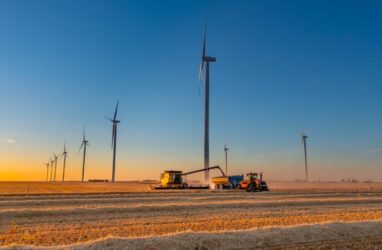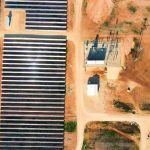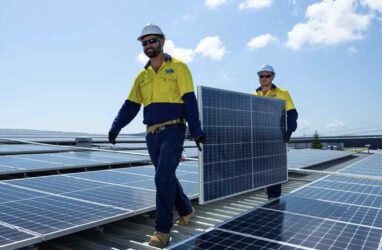Feed aggregator
Australian oiler prices the cost of carbon for new gas project
Privatised water firms are imperiling our health and poisoning our rivers. Act now: flood the streets with rage | Feargal Sharkey
It is time to say this privatisation zealotry has been a disaster. March with us and let ministers know – enough is enough
You’ve been lied to, you’ve been misled, you’ve being extorted, you’ve been cheated, and you’ve been abused. For the last 35 years, you have been subject to nothing more than possibly the greatest organised ripoff perpetrated on the British people, and you have had little in return apart from greed, profiteering, financial engineering, political failure and regulatory incompetency. You’ve been had.
Thirty-five years after we were promised a utopian, market-driven vision of greatness, a future in which we would glory in the delights of an unlimited supply of clean water; in which our sewage would be quietly, efficiently collected, treated and disposed of, while our rivers, lakes and seas would teem with an abundant, diverse array of flora and fauna; and to top it all off we would have the cheapest water bills on earth.
Feargal Sharkey is a campaigner and former lead singer of the Undertones
Continue reading...Foresters shouldn’t shy away from difficult NZ ETS conversations, expert says
The livestock lobby is waging war on ‘lab-grown meat’. This is why we can’t let them win | George Monbiot
These new proteins could be our best hope of averting catastrophe. But governments are trying to have them banned
For many years, certain car manufacturers sought to obstruct the transition to electric vehicles. It’s not hard to see why: when you have invested heavily in an existing technology, you want to extract every last drop before disinvesting. But devious as in some cases these efforts were, they seem almost innocent in comparison with the concerted programme by a legacy industry and its tame politicians to suppress a far more important switch: the essential transition away from livestock farming.
Animal farming ranks alongside fossil fuel production as one of the two most destructive industries on Earth. It’s not just the vast greenhouse gas emissions and the water and air pollution it causes. Even more important is the amount of land it requires. Land use is a crucial environmental metric, because every hectare we occupy is a hectare that cannot support wild ecosystems.
George Monbiot is a Guardian columnist
Continue reading...Clean cement outfit raises $85 mln in Series C round
Victoria lays out plan for 95 pct renewables, with no coal, not much gas and a big lift in demand
The post Victoria lays out plan for 95 pct renewables, with no coal, not much gas and a big lift in demand appeared first on RenewEconomy.
Anatomy of one of Australia’s first big solar and battery hybrid projects: The costs and revenues
The post Anatomy of one of Australia’s first big solar and battery hybrid projects: The costs and revenues appeared first on RenewEconomy.
Sweden to kill 20% of its brown bears in annual hunt
Conservationists say the number of hunting licences granted is too high and condemn it as ‘pure trophy hunting’
Sweden has issued licences to kill 20% of its brown bear population in the country’s annual bear hunt, which begins today, despite concerns from conservationists.
Officials have granted licences for just under 500 brown bears to be culled by hunters. That equates to about 20% of the total population, according to official figures, and would bring the number of bears in Sweden down to approximately 2,000 – a drop of almost 40% since 2008.
Continue reading...Has the solid-state battery riddle been solved? This start-up thinks so
The post Has the solid-state battery riddle been solved? This start-up thinks so appeared first on RenewEconomy.
NZ’s electricity market is a mess. Rolling out rooftop solar would change the game
The post NZ’s electricity market is a mess. Rolling out rooftop solar would change the game appeared first on RenewEconomy.
Huge NT solar farm backed by Mike Cannon-Brookes gets environmental approval
Go-ahead given for first stage of $30bn SunCable project, which minister says will be ‘transformational’ for Northern Territory
- Follow our Australia news live blog for latest updates
- Get our morning and afternoon news emails, free app or daily news podcast
The Australian government has given the green light to the first stages of what it describes as the country’s “biggest renewable energy project ever” – an ambitious proposal to send energy from a solar farm in the Northern Territory outback to Singapore via subsea cables.
The environment minister, Tanya Plibersek, said the approval under conservation law of SunCable’s $30bn-plus Australia-Asia Power Link was a “massive step towards making Australia a renewable energy superpower” and that the project would be “economically and socially transformational” for the NT.
Continue reading...Placing agriculture into NZ ETS would have “torpedoed the economy”, minister says
Poor compliance and broad exemptions mean land clearing continues apace in northern Australia – despite our laws and pledges
Researchers urge US industrial carbon utilisation to reach net zero goals
RGGI compliance entities expand allowance holdings in Q2, secondary market activity jumps -report
Sweden, Zambia sign Article 6 MoU
Brazilian carbon credit alliance defends REDD+ following Amazonas controversy
Compliance frameworks using offsets and CDR may steer VCM evolution, but quality concerns persist
US carves out nearly $300 mln from IRA for SAF
Badger cull may have increased bovine TB risk in neighbouring herds – study
England’s controversial eradication scheme may have caused higher rates of disease in surrounding areas, research shows
England’s controversial badger cull may have increased the risk of bovine tuberculosis (bTB) among herds in neighbouring areas, according to new research.
Researchers at the University of Oxford found that although badger culling reduced incidences of tuberculosis in the areas where it took place, in neighbouring areas the risk of the disease in cattle increased by almost a third.
Continue reading...






